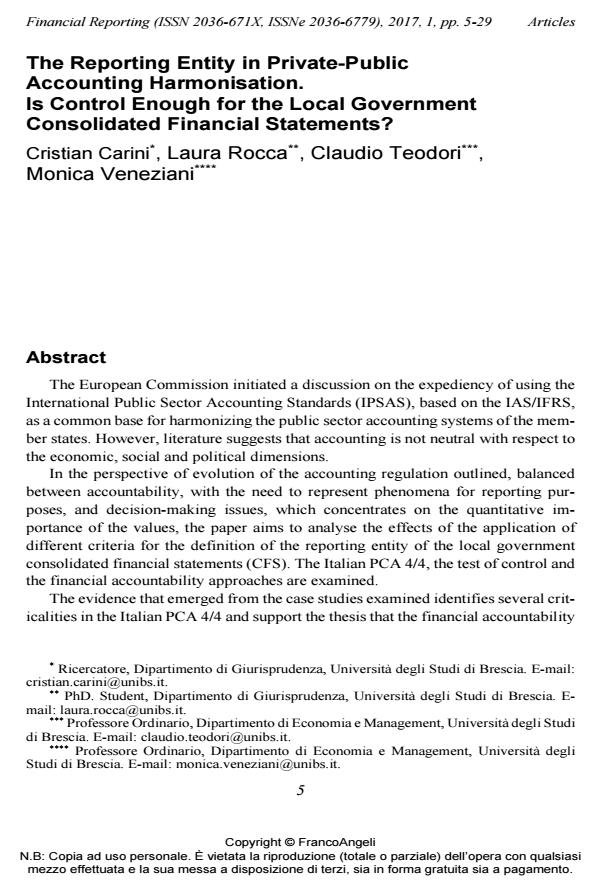The Reporting Entity in Private-Public Accounting Harmonisation. Is Control Enough for the Local Government Consolidated Financial Statements?
Titolo Rivista FINANCIAL REPORTING
Autori/Curatori Cristian Carini, Laura Rocca, Claudio Teodori, Monica Veneziani
Anno di pubblicazione 2017 Fascicolo 2017/1
Lingua Inglese Numero pagine 25 P. 5-29 Dimensione file 354 KB
DOI 10.3280/FR2017-001001
Il DOI è il codice a barre della proprietà intellettuale: per saperne di più
clicca qui
Qui sotto puoi vedere in anteprima la prima pagina di questo articolo.
Se questo articolo ti interessa, lo puoi acquistare (e scaricare in formato pdf) seguendo le facili indicazioni per acquistare il download credit. Acquista Download Credits per scaricare questo Articolo in formato PDF

FrancoAngeli è membro della Publishers International Linking Association, Inc (PILA), associazione indipendente e non profit per facilitare (attraverso i servizi tecnologici implementati da CrossRef.org) l’accesso degli studiosi ai contenuti digitali nelle pubblicazioni professionali e scientifiche.
The European Commission initiated a discussion on the expediency of using the International Public Sector Accounting Standards (IPSAS), based on the IAS/IFRS, as a common base for harmonizing the public sector accounting systems of the member states. However, literature suggests that accounting is not neutral with respect to the economic, social and political dimensions. In the perspective of evolution of the accounting regulation outlined, balanced between accountability, with the need to represent phenomena for reporting pur-poses, and decisionmaking issues, which concentrates on the quantitative importance of the values, the paper aims to analyse the effects of the application of different criteria for the definition of the reporting entity of the local government consolidated financial statements (CFS). The Italian PCA 4/4, the test of control and the financial accountability approaches are examined. The evidence that emerged from the case studies examined identifies several criticalities in the Italian PCA 4/4 and support the thesis that the financial accountability approach is more effective in providing a complete representation of the public resources entrusted to and managed by the group, whereas the control approach better approximates quantification of the group results in terms of central government surveillance. The analysis highlights the importance of the post implementation review period and the opportunity to contextualize the adoption of the consolidated financial statement in the broader spectrum of the accounting harmonization process, participating in the process of definition of the European Public Sector Accounting Standards (EPSAS).
Parole chiave:Accounting regulation, accounting harmonisation, consolidated financial statement, IPSAS, public sector accounting.
- In Search of the Creative Economy: Analyses of the Provincial and Territorial 2015-2016 Budgets from the Perspective of Arts, Culture and Heritage M. S. Jeannotte, Alain Pineau, in SSRN Electronic Journal /2015
DOI: 10.2139/ssrn.3148226 - Financial Sustainability of Public Sector Entities Cristian Carini, Claudio Teodori, pp.103 (ISBN:978-3-030-06036-7)
- Handbook of Research on Modernization and Accountability in Public Sector Management Cristian Carini, Claudio Teodori, Davide Giacomini, pp.55 (ISBN:9781522537311)
- Accounting Reform in Italy and Perceptions on the Local Government Consolidated Report Cristian Carini, Davide Giacomini, Claudio Teodori, in International Journal of Public Administration /2019 pp.195
DOI: 10.1080/01900692.2017.1423500
Cristian Carini, Laura Rocca, Claudio Teodori, Monica Veneziani, The Reporting Entity in Private-Public Accounting Harmonisation. Is Control Enough for the Local Government Consolidated Financial Statements? in "FINANCIAL REPORTING" 1/2017, pp 5-29, DOI: 10.3280/FR2017-001001